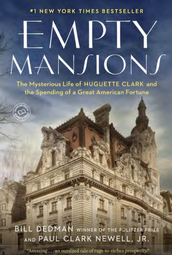A WRITER'S WIT |
My Book World

W. A. Grant builds a mining empire in the late nineteenth and early twentieth centuries, leaving his heirs quite wealthy. The youngest daughter by his second wife, Huguette Clark, makes good use of her inheritance in any number of ways. She schools herself about the things she loves: Japanese art, painting, and more. Though she commits some errors, such as marrying and then having the union annulled in a very short time, she is a prudent woman. She may be plagued, however, with one of the maladies of inherited wealth, which is a certain guilt at receiving so much for having done so little to “earn” it. As a result she seems quite generous with those she loves and trusts, almost to a fault. All someone must do is drop a hint about being short of money for some project or an upcoming bill, and she grabs her checkbook.
With that kind of naivete, she winds up trusting a crook as her money manager. In the end he bilks her out of millions, or attempts to. After Huguette dies at the age of 104, nineteen mostly distant relatives go to court to contest Huguette’s will, which leaves much of her money to those who have worked for her for years. But after it is all done, the judge awards most of her fortune to the nineteen relatives, many of whom never even meet the woman or haven’t seen her or tried to see her since they were children.
The main thrust of the book, in any case, is that W. A. Grant and his daughter (later) have as many as five large mansions built, and she never, except as a child, ever lives in any of them. She spends most of her adult life in a 5,000-square-foot apartment on Fifth Avenue across from New York’s Central Park. Instead of selling those mansions early on, however, she maintains each one of them, whether in Santa Barbara, California, or in the New York City area. Each one is fully staffed for many decades even though no one from the family, and Huguette in particular, ever abides in them. The strangest thing about her living situation is that at some point her health becomes so bad that she must go to the hospital. Once she is there, she rather likes the company and attention she receives every day, so instead of installing a nursing staff back in her Fifth Avenue apartment, she virtually moves into Doctors’ Hospital. And there she spends much of her last twenty years of life, thus expanding the motif of empty mansions. In the end, she hasn’t lived in any of them. Her story is perhaps a cautionary tale about the hazards of inheriting a large fortune. Is it really yours? And can you ever share enough of it to assuage your guilt that you might not deserve it?
Coming Next:
TUES: A Writer's Wit | Bennett Madison
WEDS: A Writer's Wit | Lara Logan
THURS: A Writer's Wit | Anna Sewell
FRI: My Book World | Elizabeth J. Lehman's Those Girls: Single Women in Sixties and Seventies Popular Culture



 RSS Feed
RSS Feed